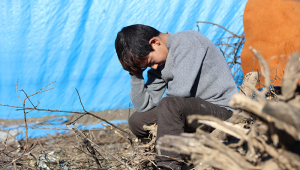The LGA said councils are facing higher bills for children’s services as a result of the crisis in Calais, which has seen thousands of migrants attempting to break through fences to board Eurotunnel trains bound for the UK.
Kent County Council leader Paul Carter, who has already met with Home Office officials, said the number of unaccompanied children who have arrived seeking asylum in recent weeks has put “enormous strain” on the authority’s social services.
He added: “We are now caring for 605 under-18s and face a shortfall of £5.5m in costs to care for them. Staff are working flat out to support these vulnerable young people through our reception centres and we are urgently looking at new premises in order to expand the facilities.”
Kent council is working with the Association of Directors of Children’s Services and other authorities to devise to a dispersal arrangement outside of the county, and LGA deputy chair David Simmonds said councils are “rallying together” to offer support.
However, he added that the government needs to commit to reimburse the costs in full because the strain on children's services budgets, which have already been stretched by cuts, risks becoming “unsustainable”.
“When an unaccompanied child arrives in the UK, it is the council area where they arrive that is responsible for all costs associated with that child up until the age of 25,” Simmonds said. “This includes schooling, foster care or children's homes, through to university fees and housing costs, whether they stay within the area or are moved elsewhere in the country.”
He added: “At the moment, these costs fall on the authorities covering the main entry points of the channel sea ports and the international airports, but the situation is becoming unsustainable as some have faced a doubling of the number of children in their care in a matter of weeks.”
Alison O’Sullivan, president of the Association of Directors of Children’s Services, added that the situation in Kent is now critical.
“There has been a gradual increase in numbers of unaccompanied asylum seeking children in the past few months and a spike in July has created an acute and immediate capacity issue for the council,” she said.
“These children, some as young as 12, are extremely vulnerable and in need of our help and support,” O’Sullivan added.
“The association is grateful for the immediate help and support given by regional colleagues in response to this situation by providing suitable accommodation to some of the vulnerable children. Because of the unprecedented pressure on London and the South East, we are also asking authorities from across the country if they can also help. And in the longer term we are working with various government departments, including the Department for Education and the Home Office, on a sustainable national response.”



















